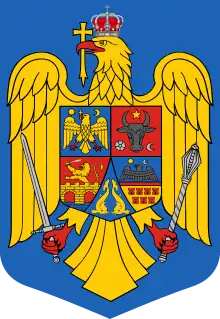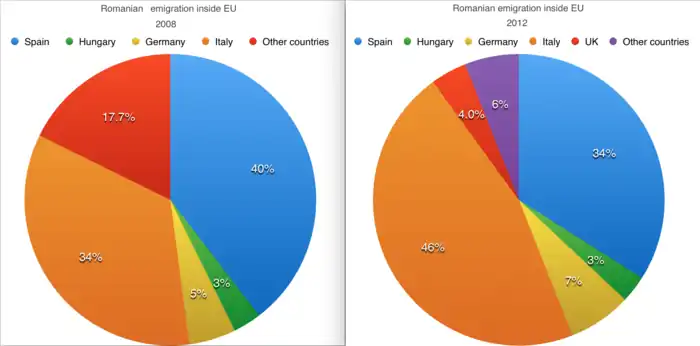| Total population | |
|---|---|
| 535,935 INE 2022 born in Romania (2022)[1] 1,079,726 (includes naturalized and second and third generation Romanians) (2022)[2] | |
| Languages | |
| Romanian, Spanish | |
| Religion | |
| Predominantly: Romanian Orthodox; also: Greek Catholic, Roman Catholic | |
| Related ethnic groups | |
| Romanian Britons, Romanian Italians, Romanian Germans, Romanian Australians, Romanian Americans, Romanian Canadians, Romanian French people | |
| Part of a series of articles on |
| Romanians |
|---|
 |
Romanians form the second largest group of foreigners in Spain, after Moroccans.[3] As of 2022, there were 535,935 Romanians in Spain,[4] Most of the immigration took place given economic reasons. The linguistic similarities between Romanian and Spanish, as well as Romanians' Latin identity, are also a reason for the country's attractiveness to Romanians.[5]
Background
After the December, 1989 Romanian Revolution, emigration was liberalized, but for the next few years, emigration to Spain was modest. It started to increase slowly during the late 1990s, and exploded after 2002. Emigration was further facilitated by the entry of Romania in the EU in 2007. By 2011, it reached a peak of nearly 900,000 people, after which the Romanian population has been steadily decreasing as a result of emigration from Spain since 2012 due to the economic problems and unemployment in the country, falling to 623,097 by 2022.[6] Because of this, the diaspora in Italy, which has continued to increase, is now considerably larger than that in Spain.
Population
| Year | Pop. | ±% |
|---|---|---|
| 1998 | 2,258 | — |
| 1999 | 3,147 | +39.4% |
| 2000 | 6,410 | +103.7% |
| 2001 | 31,641 | +393.6% |
| 2002 | 67,279 | +112.6% |
| 2003 | 137,347 | +104.1% |
| 2004 | 207,960 | +51.4% |
| 2005 | 317,366 | +52.6% |
| 2006 | 407,159 | +28.3% |
| 2007 | 527,019 | +29.4% |
| 2008 | 731,806 | +38.9% |
| 2009 | 798,892 | +9.2% |
| 2010 | 831,235 | +4.0% |
| 2011 | 865,707 | +4.1% |
| 2012 | 897,203 | +3.6% |
| 2013 | 870,258 | −3.0% |
| 2014 | 797,054 | −8.4% |
| 2015 | 752,268 | −5.6% |
| 2016 | 717,462 | −4.6% |
| 2017 | 687,733 | −4.1% |
| 2018 | 676,005 | −1.7% |
| 2019 | 671,985 | −0.6% |
| 2020 | 667,378 | −0.7% |
| 2021 | 644,473 | −3.4% |
| 2022 | 535,935[7] | −16.8% |
Romanian diaspora in Spain is today the second Romanian diaspora in the EU, after that of Italy. Romanians in Spain have settled especially in the provinces of Madrid, Castellón, Valencia, Zaragoza and Barcelona.[8]

Notable individuals
- Alexandru Buligan (b. 1960) – handball player and coach
- Mihaela Ciobanu (b. 1973) – handball player
- Cosmin Contra (b. 1975) – footballer and coach
- Gheorghe Craioveanu (b. 1968) – footballer
- Alexandru Dedu (b. 1971) – handball player
- Constantin Gâlcă (b. 1972) – footballer and coach
- Cristian Ganea (b. 1992) – footballer
- Adrian Ilie (b. 1974) – footballer
- Valeriu Lazarov (1935–2009) – television producer, director of Spanish channel Telecinco
- Gheorghe Popescu (b. 1967) – footballer
- Roxana Popa (b. 1997) – artistic gymnast
- Virgil Popa (b. 1975) – conductor
- Marcela Topor (b. 1976) – journalist
See also
References
- ↑ "Población por comunidades y provincias, país de nacimiento, edad (Grupos quinquenales) y sexo". Archived from the original on 30 January 2021. Retrieved 1 July 2020.
- ↑ "Estadística de residentes extranjeros en España" (PDF). Ministry of Inclusion, Social Security and Migration (in Spanish). p. 4. Archived (PDF) from the original on 1 April 2021. Retrieved 10 March 2022.
- ↑ "Number of Romanians in Spain declined in 2017". 26 June 2018. Archived from the original on 9 November 2021. Retrieved 10 August 2020.
- ↑ "Población por comunidades y provincias, país de nacimiento, edad (Grupos quinquenales) y sexo". Archived from the original on 30 January 2021. Retrieved 1 July 2020.
- ↑ Sorin Pâslaru (30 June 2016). "De ce trebuie România să constituie Alianţa Latină împreună cu Italia şi Spania. Ce avem de făcut în NUE – Noua Uniune Europeană". Ziarul Financiar (in Romanian). Archived from the original on 3 August 2016. Retrieved 10 March 2018.
- ↑ "Población extranjera por Nacionalidad, comunidades, Sexo y Año. Datos provisionales 2022". INE. Archived from the original on 17 June 2022. Retrieved 29 May 2022.
- ↑ "Población por comunidades y provincias, país de nacimiento, edad (Grupos quinquenales) y sexo". Archived from the original on 30 January 2021. Retrieved 1 July 2020.
- ↑ "report-spain.pdf" (PDF). December 2011. Archived (PDF) from the original on 12 April 2023. Retrieved 19 April 2023.
Sources
- "Población extranjera por sexo, país de nacionalidad y edad (hasta 85 y más).", Avance del Padrón a 1 de enero de 2009. Datos provisionales, Spain: Instituto Nacional de Estadística, 2009, archived from the original on 14 December 2009, retrieved 13 June 2009
- "Población extranjera por sexo, país de nacionalidad y edad (hasta 85 y más).", Revisión del Padrón municipal 2008. Datos a nivel nacional, comunidad autónoma y provincia., Spain: Instituto Nacional de Estadística, 2008, retrieved 13 June 2009
- "Población extranjera por sexo, país de nacionalidad y edad (hasta 85 y más).", Revisión del Padrón municipal 2007. Datos a nivel nacional, comunidad autónoma y provincia., Spain: Instituto Nacional de Estadística, 2008, retrieved 13 June 2009
